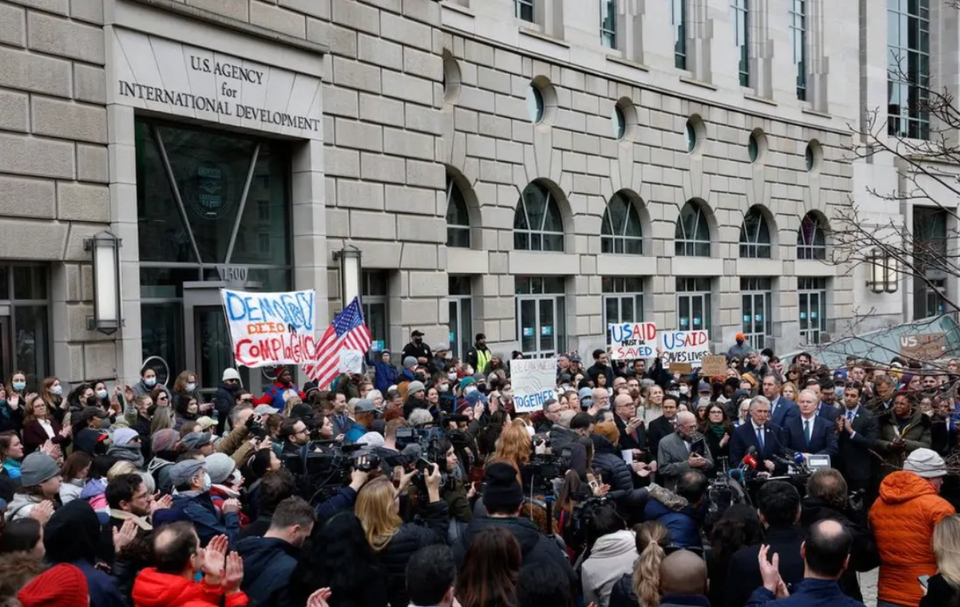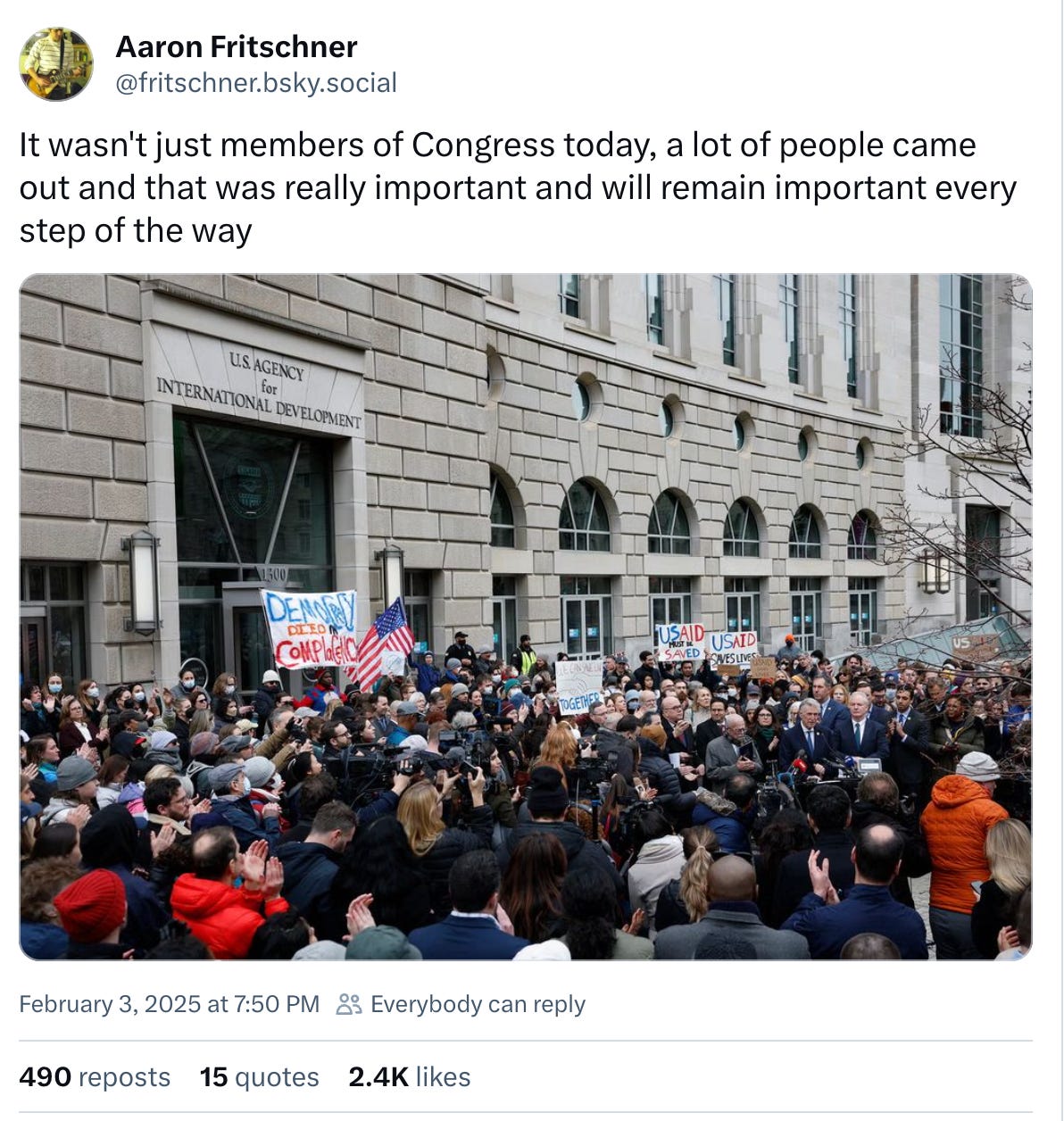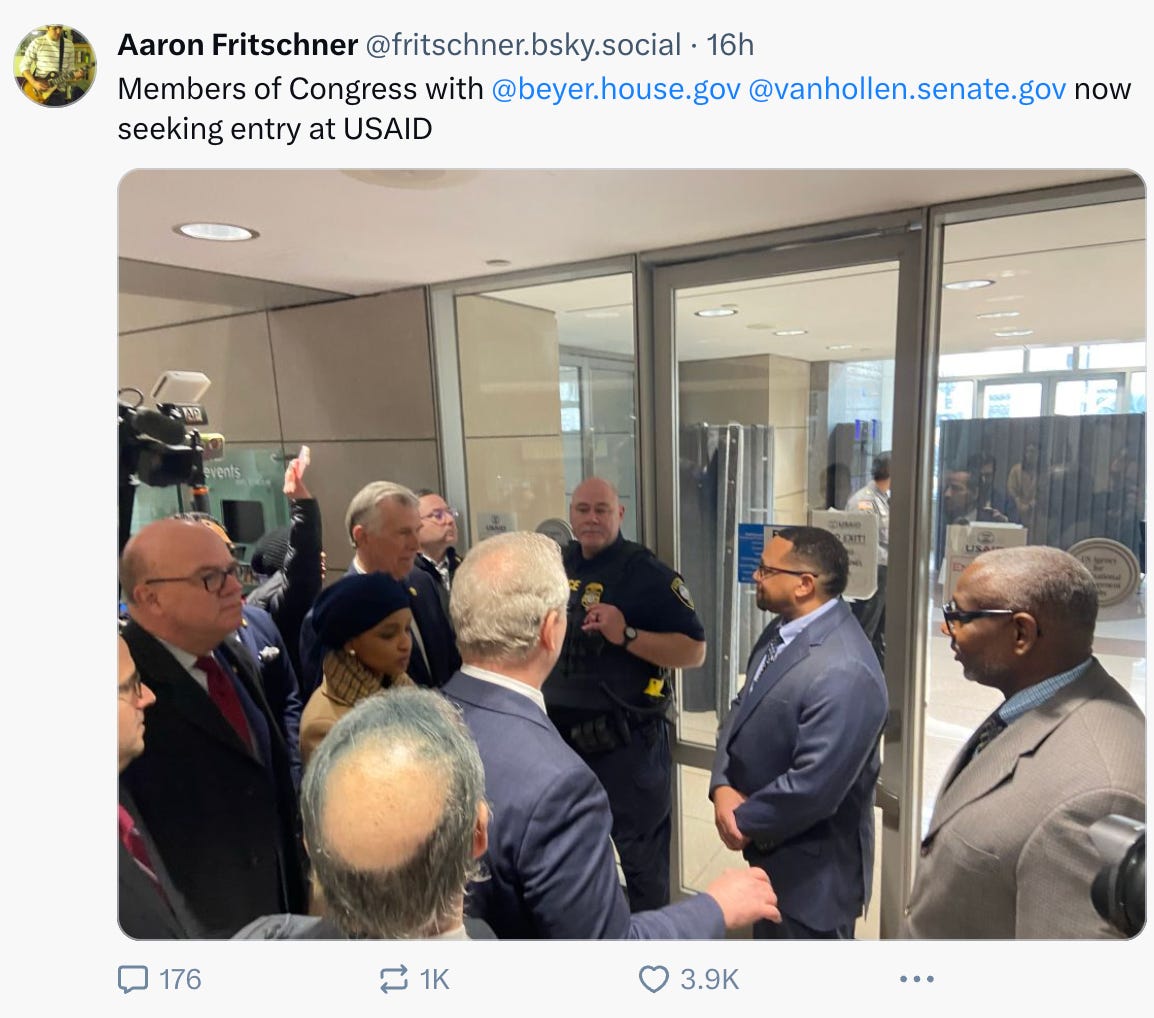The Trump administration is actively giving babies HIV

How to find hope when evil is winning.
“At a minimum, 300 babies that wouldn’t have had HIV, now do.”
Read that sentence again—if you can stand it.
That’s a quote from a report by Kate Knibbs at WIRED, which has been doing some of the best reporting on the malware attack Elon Musk and his flunkies are staging against our government.
Knibbs spoke to employees of the United States Agency for International Development (USAID) and the non-profits that work with this independent agency that represents about 1 percent of the overall federal budget yet has borne the brunt of the MAGA assault on the good we do together. These employees called bullshit on the “waiver” Trump issued to continue the work of the President's Emergency Plan for AIDS Relief, or PEPFAR, also known as the only humanitarian thing George W. Bush or any Republican president has done this century.
"Your money is being unfrozen but you can’t contact the people who actually froze it," a senior official at an HIV/AIDS organization told Knibbs. "There’s a bigger communication blockage that is frustrating even the efforts put in place to free up the lifesaving work."
Yes, they’re choosing to give babies HIV. All the Trump Administration had to do was leave it alone, but they’re giving babies with HIV instead.
Over the last year, I’ve studied the previous eight years of our history and how we got to this point by helping Marcy Wheeler put together her Ball of Thread series. Thus, I have two straightforward words to explain how Trump won again and what he’s doing now: “Grievance Myth.” And verily I tell you it’s no relief at all to know that.
What is some relief is to see elected Democrats and regular folks like you and me step up:

That post is from Aaron Fritschner, the Deputy Chief of Staff for Rep. Don Beyer, who bravely or masochistically attempted to explain to people on Bluesky what actions are most effective, mainly as an effort—I think—to explain why we didn’t see any inspirational steps from Democrats over the weekend as Elon and his flunkies were gleefully in our bases looting all of our money we use to keep babies from getting HIV.
The congressman joined with several others Monday morning to get to work focusing on this ongoing coup, which most Americans probably have no idea is happening, and very few can even comprehend this situation could not possibly be more dangerous.
We need to see our reps at the doors demanding information and action. It’s the only way to alert the public—since the media seems determined to ignore this upending of 230 years of Constitutional Order or minimize it with words like “overhaul” that fail to clarify the massive illegality and malice of what is happening all over Washington DC.

The worst part of this is how pointless this all is.
We know the few who will benefit, and we know the tens of millions who will get vicarious jollies from it because they’ve been trained to believe that this aid organization, which makes up, again, 1% of our budget, accounts for much of our deficit. We know it’s all a ruse to hide the real reason for our deficit and growing debt—tax cuts for guys like Elon and the wealthiest humans ever to live who want for nothing in this world.
That’s why we are now, as a nation, actively giving babies HIV. And at this moment, any honest person may tell you that we don’t yet know how to stop it or if we even can.
It’s too much to bear. And I know you may suffer from the same occasional or inescapable hopelessness.
Hope is a discipline, as Mariame Kaba says often. In an interview, she explained:
[H]ope doesn’t preclude feeling sadness or frustration or anger or any other emotion that makes total sense. Hope isn’t an emotion, you know? Hope is not optimism.
I think that for me, understanding that is really helpful in my practice around organizing, which is that, I believe that there’s always a potential for transformation and for change. And that is in any direction, good or bad. The idea of hope being a discipline is something I heard from a nun many years ago who was talking about it in conjunction with making sure we were of the world and in the world. Living in the afterlife already in the present was kind of a form of escape, but that actually it was really, really important for us to live in the world and be of the world. The hope that she was talking about was this grounded hope that was practiced every day, that people actually practiced it all the time.
Kaba’s work focuses on the incarcerated of America, those who have suffered fascism fueled by racism and classism since pretty much the founding. Their agony goes primarily unnoticed by a country filled with people who know our privilege or our skin color (and not our moral rectitude) keeps us from getting trapped in a remorseless penal system that imprisons more people than the rest of the world by orders of magnitude.
Focusing on ending or at least alleviating that kind of misery requires discipline. And having some hope for this country, which has failed in so many ways but at least was not actively giving babies HIV until a couple of weeks ago, to a different degree, requires discipline.
I found a lot of solace in a recent episode of The Hidden Brain, where Brian Klaas explained his work about how flukey history and fate are, with the slightest twists changing everything beyond our comprehension:
And so I think there's some of these lessons that I've incorporated where you just sort of have to think, we're all in this ride that is extremely bizarre, contingent, swayed by randomness, swayed by luck, etc. And we're happy to be here, we're lucky to be here, and that every moment that I have is influencing the future in some ripple effect that I don't know how it's gonna play out. There's something so magical and awe-inspiring about that, that it has just utterly transformed how I think about my life, and it's made me a much happier person. So what's interesting is that a lot of people, they first encounter my ideas or the ideas of chance and randomness, and they become nihilists, right? Nothing matters. And my argument is no, everything matters, even the tiniest stuff.
Everything matters, even the tiniest stuff.
At my bleakest moments, I think of something Andrea Pitzer has said a couple of times in Next Comes What—a podcast that uses the history of authoritarianism as a guide for thwarting Trump—at the very least we are making a record. She cites multiple examples of justice coming for authoritarians years and even decades later. That kind of thinking requires hope—maybe too much hope right now. Perhaps you need something more immediate, like the hope that Elon’s hair plugs made him impotent. Whatever keeps you going because it all matters.
In my post based on Aaron Fritschner’s thread, I spoke about the need for Democrats to preach to the choir. I’ll repeat that I believe Democratic officials have but two overarching goals right now, and they’re as intertwined as DNA or Elon and Donald:
- Keep democracy alive.
- Keep the Democratic base activated, hopeful, and helpful.
You could say that number two is our work alone. But to be helpful, we must be in this together, fighting evil, trying to save Medicaid, and working to keep our government from actively giving babies HIV.
Discipline also involves recognizing where our power ends and caring for ourselves and others. But Kaba herself doesn’t believe in “self-care” as a concept.
“I believe in collective care, collectivizing our care, and thinking more about how we can help each other,” she said.
I’m grateful our reps are beginning to step up, even as they falter in other ways. If you ask what gives me the most hope, ask!
OK, what gives me the most hope is that we can only do this together. Part of my discipline is to try to grow that and give people ways to act. Another part is to remind myself that all my choices have consequences, and those consequences will never affect me alone. Life is a responsibility—and it’s one I’m glad to have.
Member discussion